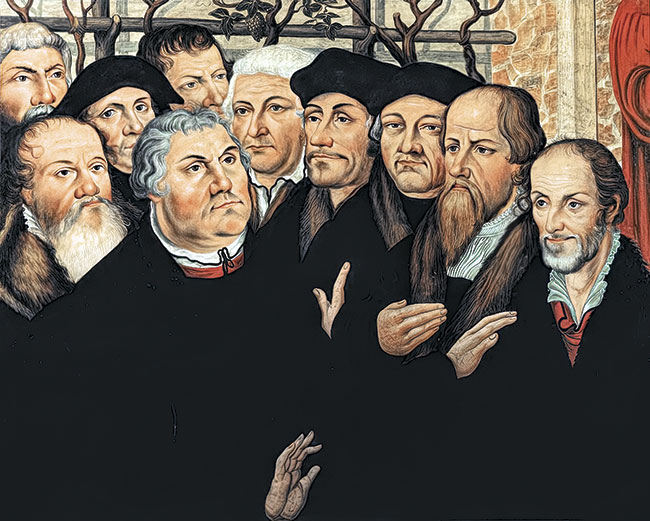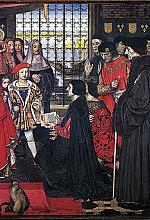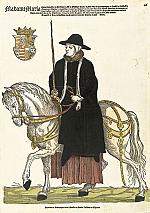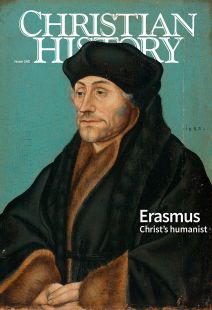Debating over the Promised Land

[above: Erasmus with the reformers? Copy of The Meienburg Epitaph by Lucas Cranach the Elder, 1550. Lutherhaus—AKG Images / Public domain, Wikimedia]
Erasmus befriended many future reformers. His biblical humanism struck a chord that resonated with their hunger for reform. As he produced his New Testament in Basel in 1514–1516, many gathered around him before becoming Reformation leaders in places like Strasbourg, Basel, and Zurich: Wolfgang Capito (c. 1478–1541), Johann Oecolampadius (see pp. 36–39), and Konrad Pellikan (1478–1556). Others such as Ulrich Zwingli (1484–1531) and Martin Bucer (1491–1551) were committed Erasmians before Luther’s rise to fame.
Erasmus would never escape association with, and even blame for, some of what followed. According to Luther, Erasmus would always be like Moses: able to see the Promised Land from afar, but never able to enter it himself.
Teacher or redeemer?
Erasmus never met Martin Luther personally, and by the mid-1520s, it was clear that the two men had fundamentally different approaches to the study of Scripture. Erasmus’s connections with the Swiss and south German reformers were much stronger and more personal. His biblical humanist approach, characterized by careful study of the original languages as part of the exegesis of Scripture, combined with a concerted effort to reform church and society, paralleled the reforms these men desired.
In his pedagogical and devotional works, Erasmus criticized the abstract and irrelevant theology of medieval scholastic theologians, the moral failings and fiscal abuses of the clergy, and the superstition and ignorance of the laity. Rejecting too great a reliance on ceremonies and sacramental actions, he advocated an internalized and Christ-centered piety, “the philosophy of Christ,” shaping one’s daily conduct.
He argued that laypeople should be able to read the Bible, and, when he published an expanded version of his System and Method of True Theology as a separate treatise in 1520, it became one of his most influential works.
Conservative theologians who felt that knowledge of Greek and Hebrew was not necessary for the study of Scripture challenged this. They were concerned that his text-critical work undermined the authority of the Vulgate, the Latin translation of the Bible used to formulate doctrine. When Luther first came to public attention with his criticism of indulgences, many saw him as a proponent of the same biblical humanism Erasmus was championing and associated the early “Luther affair” with the conflict between scholasticism and humanism (see pp. 11–14). Many of Erasmus’s defenders became early supporters of Luther.
In 1516 Luther criticized Erasmus for not understanding Paul’s discussion of the law in the Epistle to the Romans. Erasmus did not share Luther’s deep awareness of the gulf separating sinful humans from a righteous God. For Luther the essential distinction between law—teaching humankind’s complete inability to please God—and gospel—God’s gracious offer of forgiveness through Christ—was key to interpreting Scripture. In Luther’s eyes Erasmus’s emphasis on Christian conduct detracted from Christ’s role as redeemer and downgraded him to merely a teacher.
In the early years of the Reformation, however, many did not perceive this fundamental difference between the two men. Erasmus himself tried to walk a fine line between Luther and the Catholic Church, defending Luther’s right to be heard but avoiding any public endorsement of Luther’s teachings. Erasmus’s friends in Basel did not share his caution, however. They oversaw the reprinting of Luther’s treatises in that city, working with other printers after Erasmus forbade his publisher, Johann Froben (see pp. 36–39), from taking part in this profitable venture.
Through the early Reformation, Erasmus lived in the Netherlands, but persecution of Luther’s supporters there steadily increased, and he moved to Basel in 1521. Support for the evangelical movement—as the new reforms were known—in Basel grew rapidly, and Erasmus’s former editorial assistant, Oecolampadius, became its most prominent spokesman when he too returned to Basel in 1522.
The two remained on friendly terms, but as the evangelicals moved from preaching into liturgical and institutional reform, Erasmus began to distance himself from his earlier colleagues. He would not allow Oecolampadius to claim him as “our Erasmus” in the preface of an Isaiah commentary, and he warned Zwingli to act with greater moderation and prudence. By the end of 1523, he had broken off correspondence with Zwingli.
A poor theologian?
Erasmus publicly rejected Luther in Diatribe on Free Will (1524). Asserting that Scripture could be difficult to understand and that theological controversy does more harm than good, Erasmus argued that most interpreters gave some role to the human will in salvation. Luther responded with Bondage of the Will (1525) in which he famously compared the human will to a beast ridden either by God or by Satan. Erasmus published a lengthy response, but Luther refused further debate. Over the next decade, Luther continued to read Erasmus’s works but criticized him in private as a skeptic and a poor theologian concerned only with morality.
The disagreement became public again a decade later. In 1534 Luther published a harsh attack on Erasmus, accusing him of questioning the doctrine of the Trinity. In his view Erasmus’s skepticism made him incapable of teaching sure doctrine. Erasmus quickly published a response, defending himself and calling Luther to task for abusive language. The public quarrel ended there; Philipp Melanchthon (1497–1560) and others prevailed upon Luther not to respond. As his older colleague did, Melanchthon rejected Erasmus’s approach to interpreting Scripture, but he expressed his criticisms in a more subtle way and was able to maintain an occasional correspondence with Erasmus despite their disagreements.
“False evangelicals”
Erasmus’s relationship with Swiss and south German reformers soured in different ways than that with Luther and Melanchthon. Both Zwingli and Oecolampadius agreed with Luther, not Erasmus, about the powerlessness of the human will in salvation, but a more significant source of disagreement between Erasmus and his former disciples was the Eucharist. In the fall of 1524, Andreas Karlstadt (1486–1541) published several pamphlets in Basel in which he argued that the bread and wine of the Lord’s Supper are not transformed into Christ’s actual body and blood during the Mass.
Both Zwingli and Oecolampadius sided with Karlstadt, and they cited Erasmus’s annotations on several key New Testament verses to support their position. Making matters even worse for Erasmus, reports circulated that Erasmus agreed with Zwingli about the sacrament.
Enraged, Erasmus attacked his former colleagues both in private letters and in print. He rejected the claim that the elements remain mere bread and wine and asserted that he held to the consensus of the church concerning the Eucharist (see pp. 20–21). He did not specify what that “consensus” was, though, nor did he explicitly endorse the doctrine of transubstantiation. Oecolampadius later complained bitterly about those who swore they believed what the church prescribed but privately told their friends they would believe otherwise if the church permitted it.
Despite these disagreements Erasmus remained in Basel, which allowed both Catholic and Protestant worship, until 1529 when the city officially adopted the Reformation and abolished the Mass. To avoid the appearance of approving, Erasmus moved to the Catholic city of Freiburg. There he wrote Epistle Against the False Evangelicals (1529) in which he called the fruits of the Reformation licentiousness and the undermining of all authority.
The pure church that the reformers sought had never existed, he said, and in rejecting the Roman church, the evangelicals had thrown the baby out with the bathwater. Strasbourg reformer Bucer responded with a defense of the evangelical movement, but this only prompted Erasmus to publish a bitter response in which he repeated his accusation that evangelical innovations had harmed Christendom.
Erasmus’s publications against the “false evangelicals” not only expressed disagreement with them but also tried to counter the accusations of some Catholic theologians that he had “laid the egg that Luther hatched” (see p. 1). Other moderate Catholics, however, continued to esteem Erasmus and hoped to heal the schism dividing the church. During the Diet of Augsburg in 1530, they asked him to attend in person, in the hope that he could aid reconciliation. (He did not go.)
Pleading for unity
With the threat of war increasing, Erasmus published On Restoring the Unity of the Church (1533), arguing that agreement was necessary only on a relatively small number of points; differences concerning ceremonies and other practices were allowable. Lutherans and Catholics alike rejected Erasmus’s approach, but he found support from moderates on both sides. His suggestion that learned and pious men come together to establish doctrinal consensus proved unworkable between Protestants and Catholics in the 1540s, but, in a more limited way, it would bear fruit in the second half of the century, as Reformed and Lutheran theologians separately formulated confessions defining their positions.
Unlike Luther, who had no interest in maintaining any contact with Erasmus, all of the Swiss and south German reformers he had mentored continued to esteem him. From the beginning of the Reformation, they had wholeheartedly embraced his approach to the interpretation of Scripture, and Erasmus’s repudiation of his former colleagues did little to damage their admiration for him.
Oecolampadius’s discussions of biblical exegesis in his commentaries and treatises on the Lord’s Supper echoed Erasmus’s guidelines in the System and Method. In his study plan for theology students, young Heinrich Bullinger (1504–1575) recommended Erasmus as the best commentator on the New Testament. The 1531 Zurich translation of the Bible, to which Zwingli contributed, listed Erasmus and Augustine as chief authorities, and Hebrew professor Pellikan relied extensively on Erasmus’s New Testament paraphrases in his own New Testament commentary.
Zurich pastor Leo Jud (1482–1542) translated several of Erasmus’s works into German, and Capito translated Erasmus’s proposal for reuniting the church. These men valued not just Erasmus’s scholarship but also their personal relationships with him. After the aging and ailing Erasmus returned to Basel in 1535, Capito and Pellikan visited him.
Although Erasmus rejected the innovations of these reformers, they continued to claim him after death. He was buried in Basel’s cathedral with full honors, and Oswald Myconius (1488–1552), the leader of the city’s Protestant church, preached the funeral sermon. In 1540 the first complete edition of his writings was published in Basel.
Reacting to Protestant adulation of Erasmus, the church to which he gave his loyalty turned against him at the Council of Trent and placed his works on the Index of Prohibited Books. This prohibition was later relaxed, and Catholics circulated expurgated versions of his works. Only in the twentieth century, especially in the wake of the Second Vatican Council, have Catholic views of Erasmus become more positive. Perhaps Erasmus never entered the Promised Land, but he stood on the bridge between reformers and Catholics that Luther instead chose to burn. CH
By Amy Nelson Burnett
[Christian History originally published this article in Christian History Issue #145 in 2022]
Amy Nelson Burnett is Paula and D. B. Varner University Professor of History at the University of Nebraska–Lincoln. She is the author or editor of numerous books on the Reformation, including Debating the Reformation, Teaching the Reformation, and The Yoke of Christ.Next articles
Living the simple life
“What else is a city,” Erasmus wrote, “but a great monastery?”
Edwin Woodruff TaitColleagues and critics
Erasmus and his complex relationships with his contemporaries
Jennifer A. Boardman







